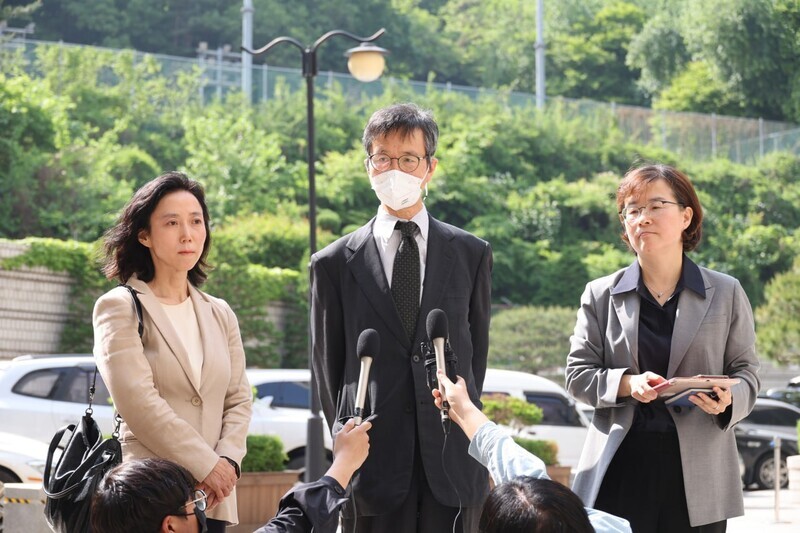hankyoreh
Links to other country sites 다른 나라 사이트 링크
Japanese postwar litigation expert says first ruling against “comfort women” was mistaken

Attorney Seita Yamamoto, an expert on postwar reparation cases who has represented victims of forced labor and sexual slavery by Japan in various lawsuits, appeared as a witness in a Korean court.
He argued that the court of first instance in a compensation case brought by Korean victims of the “comfort women” system against the Japanese government failed to reflect recent changes in the interpretation of international law and asked the appeals court to make a forward-looking judgment.
“It has been more than 10 years since the International Court of Justice (ICJ) made the Ferrini judgment in 2012, and the circumstances have changed significantly since then,” Yamamoto stated as he appeared as a witness for the plaintiffs in the appellate trial of the comfort women’s damages claim case, which was heard by a civil division of the Seoul High Court on Thursday. He also stated that the ICJ’s judgment “should not be applied in the present as it was 10 years ago.”
In 2012, the ICJ ruled that the German government was not liable to compensate Luigi Ferrini, an Italian national, for its World War II crimes by applying the doctrine of state immunity. The Italian Supreme Court had upheld that the German government was liable.
Yamamoto argued that the court of first instance’s dismissal of the current case was a result of its citation of the customary international law, which includes the Ferrini judgment.
In April 2021, the first instance court dismissed the case, stating, “Under the customary international law of state immunity in effect at the time and the Supreme Court’s precedents on the subject, it is not possible to claim damages against the Japanese government for its sovereign acts.”
“Denying state immunity to Japan would inevitably lead to a conflict in diplomatic relations with Japan during the judgment and subsequent enforcement of the judgment,” the court added, referring to the Ferrini decision.
“The ‘exception’ that state immunity does not apply to unlawful acts of foreign governments in the interest of human rights has already been adopted by the majority of countries and has become a customary practice of international law,” Yamamoto said. “When there is a victim of a human rights violation and the victim’s last recourse is a domestic court, the rights of the victim override state immunity.”
Yamamoto is one of Japan’s leading postwar compensation lawyers, having won the first trial on behalf of the victims in 1992, when 10 Japanese comfort women and Korean Women’s Volunteer Labour Corps victims sought compensation from the Japanese government. The defendant, the Japanese government, did not appear in court today.
“I was dragged [to Japan] at the age of 14 and tortured, and that has haunted me to this day. I am still very sick and have had to have surgery,” said Lee Yong-soo, the sole surviving plaintiff from the first trial.
“I have been raising my voice for over 30 years for the Japanese government to apologize and compensate the comfort women. However, Japan has done nothing. Prime Minister Kishida lied when he said his heart aches. It’s so unjust, it hurts too much.”
By Kwon Ji-dam, staff reporter; Lee Jeong-gyu, staff reporter
Please direct questions or comments to [english@hani.co.kr]

Editorial・opinion
![[Column] Life on our Trisolaris [Column] Life on our Trisolaris](https://flexible.img.hani.co.kr/flexible/normal/500/300/imgdb/original/2024/0505/4817148682278544.jpg) [Column] Life on our Trisolaris
[Column] Life on our Trisolaris![[Editorial] Penalties for airing allegations against Korea’s first lady endanger free press [Editorial] Penalties for airing allegations against Korea’s first lady endanger free press](https://flexible.img.hani.co.kr/flexible/normal/500/300/imgdb/original/2024/0502/1817146398095106.jpg) [Editorial] Penalties for airing allegations against Korea’s first lady endanger free press
[Editorial] Penalties for airing allegations against Korea’s first lady endanger free press- [Editorial] Yoon must halt procurement of SM-3 interceptor missiles
- [Guest essay] Maybe Korea’s rapid population decline is an opportunity, not a crisis
- [Column] Can Yoon steer diplomacy with Russia, China back on track?
- [Column] Season 2 of special prosecutor probe may be coming to Korea soon
- [Column] Park Geun-hye déjà vu in Yoon Suk-yeol
- [Editorial] New weight of N. Korea’s nuclear threats makes dialogue all the more urgent
- [Guest essay] The real reason Korea’s new right wants to dub Rhee a founding father
- [Column] ‘Choson’: Is it time we start referring to N. Korea in its own terms?
Most viewed articles
- 1New sex-ed guidelines forbid teaching about homosexuality
- 260% of young Koreans see no need to have kids after marriage
- 3[Column] Life on our Trisolaris
- 4OECD upgrades Korea’s growth forecast from 2.2% to 2.6%
- 5Presidential office warns of veto in response to opposition passing special counsel probe act
- 6Months and months of overdue wages are pushing migrant workers in Korea into debt
- 7[Guest essay] Maybe Korea’s rapid population decline is an opportunity, not a crisis
- 8Trump asks why US would defend Korea, hints at hiking Seoul’s defense cost burden
- 9[Editorial] Penalties for airing allegations against Korea’s first lady endanger free press
- 10Japan says it’s not pressuring Naver to sell Line, but Korean insiders say otherwise